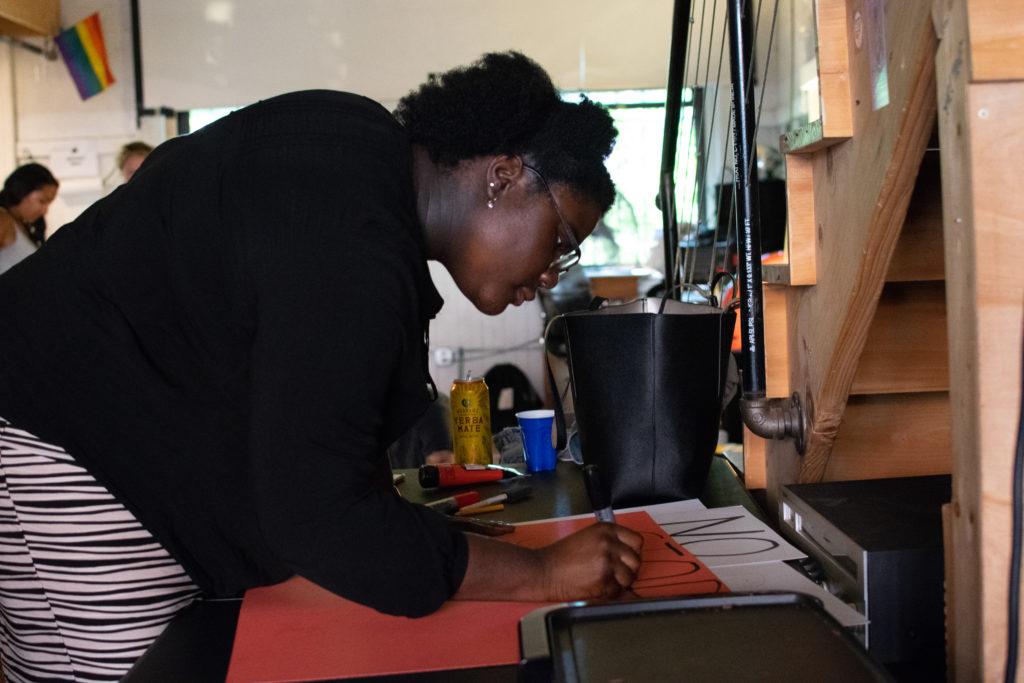Northeastern faces student backlash over ICE contract
July 23, 2018
Student activists are currently pressuring the NU administration to end a $7.8 million contract with U.S. Immigration and Customs Enforcement, a government agency that is facing significant criticism from the public after President Donald J. Trump’s immigration crackdown and family separation policy.
“Northeastern is directly helping the organization that is tearing families apart,” said third year journalism major Michelle Faulkner, who attended a sign-making event in preparation for a protest against the university.
The contract between the university, which studies dual-use technologies, and the agency, also known as ICE, was first made public in a Money magazine article June 27 listing different organizations doing business with the agency. Less than two weeks after the article was published, a petition asking the university to cut all ties with ICE went viral. The idea came from Evan Greer, a local activist and musician, who said she couldn’t believe this was happening so close to home.
“I ride my bike by Northeastern every day,” Greer said. “I couldn’t believe they have a contract with ICE. I felt like I had to do something.”
At press time, more than 2,000 students, alumni and community members had signed the petition.
Additionally, student activists led a protest against ICE Wednesday on Krentzman Quadrangle. According to the Facebook event for the protest, over 200 students marched their way through the quad, chanting, “ICE has got to go.”
The protest happened to coincide with an email that the Trump campaign sent out to supporters, accusing liberals of seeking open borders. “Not a chance!” the email said. “So long as I’m your President, ICE WILL ALWAYS DEFEND OUR COUNTRY!”
According to the contract details, the university has only been awarded $2.7 million as of July, but the contract has a potential amount of nearly $7.8 million and focuses on tracking the statistics of dual-use technologies that are exported from the United States. These technologies are products that could be used for simple tasks, like machine repair, but that could also be used in the construction of a weapon. The research conducted for the agency looks into cases where this technology is exported to countries or companies the U.S. government finds questionable, such as Iran or Syria.
The professor conducting research with the funds, Glenn Pierce, is the principal research scientist for the department of sociology. He believes that the protesters’ intentions are misguided.
“This contract is with ICE because they are the agency that is responsible for collecting data on exported goods,” Pierce said. “We’re discussing something that has no overlap with [the protesters’] concerns.”
The university echoed Pierce’s sentiment. Renata Nyul, Northeastern’s vice president of communications, said students who oppose the contract should know the facts as well.
“This research grant, obtained by a Northeastern University professor during the Obama administration, is for data research to prevent the import and export of weapons of mass destruction,” Nyul said in a July 9 e-mail to The News. “While we support the right and the freedom to protest, we hope that those who are planning to join this particular protest will take the time to learn the facts.”
In a public statement, the university also defended the contract by arguing that professors have a right to academic freedom.
“Our commitment to academic freedom goes beyond protecting what professors say; it also means allowing faculty members to freely pursue researching funding in their fields of expertise,” the July 8 statement said. “Efforts to restrict which federal agencies a faculty member can approach for research funding are antithetical to academic freedom.”
Faulkner said the university’s statements avoided addressing the protest’s purpose.
“ICE is ICE at the end of the day,” Faulkner said. “If you’re helping a dangerous institution, you can’t scapegoat it.”
Greer believes the university’s statement belittles the students’ message.
“It’s a little bit patronizing to say that students don’t understand the context,” Greer said. “[The university] has said its piece and students understand the contract. I find it really ironic that the contract’s research focuses on what happens when tech is used for alternative purposes. The methodology in this research can be used for other things as well, such as border surveillance.”
ICE responded to the student march in a July 11 statement by calling the students’ intentions “misguided.”
“Cancelling such a critical research effort to help combat terrorist explosive attacks would be unproductive and short-sighted, to say the least,” said ICE spokesperson John Mohan in the statement.
According to Pierce, his research will be coming to an end in a few months, only two years into the five-year contract. The university, Pierce and ICE have yet to release an explanation as to why the research is concluding prematurely.
During the sign-making event, Faulkner drew on her personal experience to explain why she was participating in the protest.
“I am an immigrant. I have spent my life moving from place to place,” Faulkner said. “I know what it is like to not feel welcomed. To know that my university is helping an agency that does just that hurts me tremendously.”







